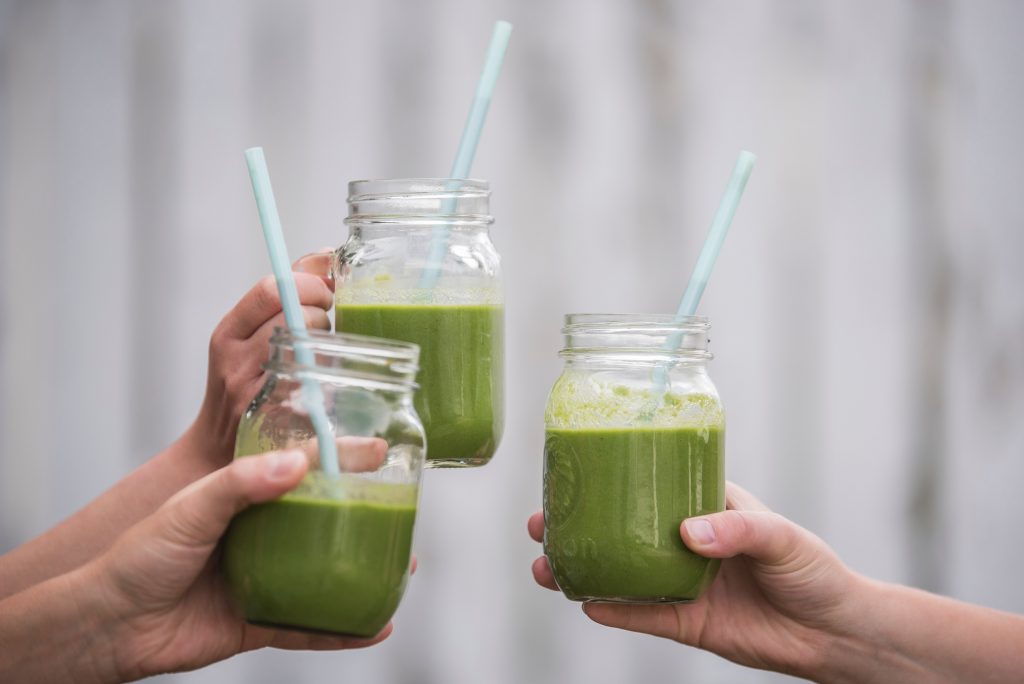My 4-Week Celery Juice Challenge

Two words: celery juice.
As I’ve learned over the past few months, these simple words can trigger a range of thoughts, opinions, and strong emotions. Some people absolutely love and swear by celery juice, claiming it radically improved their health in countless ways. A surprising number of others literally gagged at the thought of celery juice and made their dislike of the smell and flavor very apparent. And then you’ve got people in the middle, those who enjoy it as part of an occasional juice, but overall have no strong opinion one way or the other. It’s safe to say that I am a huge fan of all vegetables, but when it comes to celery, I was admittedly in the neutral category.
Over the past year, I have noticed an increasing number of my patients asking if they should add celery juice to their morning routine because they were hearing so many good things about it. This trend has become so popular, there’s even been a celery shortage all over Los Angeles! Based on lists and blogs found on the internet, celery juice can do the following:
- Starve the Epstein-Barr virus, HHV-6, shingles, and Streptococcus, which can help reverse autoimmune conditions.
- Reverse inflammation.
- Reverse gastrointestinal conditions such as irritable bowel syndrome, small intestinal bacterial overgrowth, and gastroesophageal reflux disease.
- Heal people with depression, anxiety, brain fog, confusion, bipolar disorder, memory loss, Alzheimer’s disease, obsessive-compulsive disorder (OCD), attention-deficit/hyperactivity disorder (ADHD), and posttraumatic stress disorder (PTSD).
Wow! That sounds pretty impressive, so I decided to dig a little deeper into the research. Although all vegetables provide important nutrients, there are still plenty of people who believe celery has nothing significant to offer. However, contrary to popular belief, this crunchy veggie does, in fact, pack a good nutritional punch. Studies have found that celery’s flavonoid and polyphenol content may reduce inflammation, cancer risk, diabetes, and can reduce oxidative damage. It contains antioxidants which have been linked to increasing fertility and lowering blood sugar and serum lipid levels, and there are likely many other beneficial compounds we have yet to discover. However, to say that celery juice starves certain infections, reverses gastrointestinal diseases, and heals people from a variety of neurological conditions is currently unsubstantiated.
In functional medicine, we look to both the science as well as clinical experience. Just because particular claims have not been yet been proven by rigorous scientific studies does not mean it does not offer benefits. However, to say that one single food can reverse and “heal” so many conditions is a red flag. This is a similar mindset to conventional medicine- trying to find one single compound that will cure disease. I understand the draw and the desire to find one thing that will end so much suffering, but the body is very complex and this is unlikely to be the case. Still, I was intrigued enough to take on the celery challenge for myself. I was also able to convince my colleague Eileen Bote and my friend Mary, who suffers from autoimmunity, to join me.
The three of us wound up dedicating 4 weeks to the celery juice challenge, but we did things a little differently. For 2 weeks, we drank 16 ounces of celery juice first thing in the morning, 30 minutes before meals as recommended. The remaining 2 weeks we drank 16 ounces of plain water first thing before meals to compare how we felt. Here’s what happened:
- Eileen’s experience: Of course, water is easier first thing in the morning rather than making 16 ounces of celery juice, but additionally I did not feel anything drastically different while drinking celery juice. In fact, occasionally the celery juice made me feel a bit nauseated. Water wins!
- Mary’s experience: I felt that the gastrointestinal (GI) distress of drinking celery juice was not worth any benefits, while drinking water actually made me feel better. During the challenge, I experienced loose stools and urgency almost every morning along with cramping. My stools also felt acidic. The only benefits I felt were better hydration and feeling a bit more awake and alert. However, I felt these benefits from just drinking water and I didn’t look forward to the morning routine of drinking celery juice (often having to pinch my nose to get it down). My vitiligo didn’t improve, which is one of the main things I was watching for. However, drinking 16 ounces of water was great and I felt more energy throughout the morning without any of the GI distress. Water also helped keep me regular and made my bowel movements seem healthier.
- My experience: At first, I found it relatively easy to drink 16 ounces of celery juice. It felt hydrating and refreshing first thing, but as the days went on, it started to become more difficult to drink all of it. After day 3 or 4, I began feeling some nausea, and around this same time found out that celery juice is a very effective laxative for me. This effect became more intense as the challenge went on, and within the last 3 days of the challenge, it became almost physically unbearable and began interfering with my work (several runs to the bathroom while trying to remain present for my patients is quite the challenge). Yet, the experience wasn’t all negative. I began looking forward to making and drinking a daily vegetable juice, and by the end of the second week, my psoriasis had significantly cleared up. It is important to note that I was also doing other things to address the psoriasis, such as following a gluten and dairy-free diet, taking a curcumin supplement, and putting topical CBD on the psoriatic skin. But after a couple of weeks without celery juice and only water, with everything else remaining the same, my skin did flare up again. Quite interesting! Unfortunately, even if celery was in fact the main thing helping my psoriasis, the gastrointestinal symptoms were not worth it.
Was 2 weeks enough to truly see if daily celery juice could reverse autoimmune disease? No, but it was long enough to experience how it made us feel and decide if we thought it was worth continuing. For us, we did not feel it was sustainable or that the benefits outweighed the way it made us feel. I also know that a whole food plant-based diet that is rich in a diverse array of vegetables and fruit is ultimately going to create more health long-term than one specific food can on its own.
Pretty much everyone I know, including myself, would benefit from being better hydrated and eating more vegetables, and this trend encourages both. It also encourages healthy habits. I believe these are key reasons why this trend has had such a positive impact on so many.
When someone makes even one healthy change to their diet or lifestyle, there is often a domino effect which can result in many health benefits. Starting your day with a healthy routine is one of the most powerful things you can do to improve your health, whether that be juicing a bunch of celery, making a smoothie with a variety of vegetables (my recommendation is to blend so that you retain all of the beneficial fiber), drinking plenty of water, taking a cold shower, or meditating.
There is also a lot to be said about the power of our thoughts and beliefs. After seeing all of the pictures, hearing testimonials and conviction from people who claim to be cured by celery juice, do you then believe it will be the magic bullet to turn your health around? If so, then maybe it will, at least for a period of time. This is because our expectations and beliefs literally shape our biology. This has even been demonstrated in research, and one of my favorite authors on this topic is Dr. Bruce Lipton. His book, Biology of Belief: Unleashing the Power of Consciousness, Matter & Miracles, explains the science behind this incredible phenomenon, including the placebo effect.
Let’s be honest, there are far worse trends one can follow in an attempt to improve health. Do you feel that celery juice works for you? If so, that’s great, go for it! It is generally safe, poses little risk, and you will be getting plenty of health benefits. A handful of my patients feel it has made a huge difference, while others simply despise it. This, just as with everything else in health and nutrition, demonstrates that we are all unique and our bio-individuality will impact how we respond to different foods and therapies.
We need to learn to listen to our bodies for guidance, not the latest trend or how something makes someone else feel. And even if celery juice does work for you, I caution you from getting too focused on any one food. The key to a sustainable healthy diet is food diversity, the way mother nature intended! There are so many beautiful, amazing, healing vegetables out there and we should resist the urge to fall into the “one food as a cure” trap. So, if it works, go on and have your celery juice, but don’t let that (or any) one vegetable juice take the place of the myriad of colors, flavors, and textures that come from eating a variety of plant-based foods every day.

